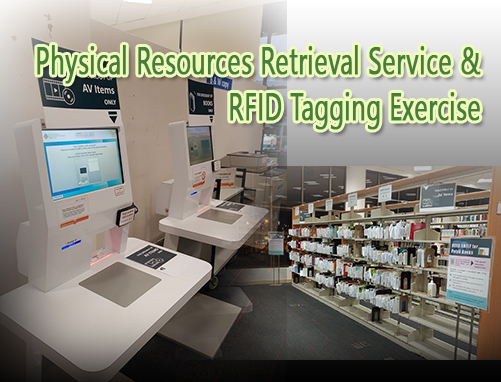Physical Resources Retrieval Service and RFID Tagging Exercise

June 1, 2020
 The Library introduced the special Physical Resources Retrieval Service in Feb 2020 which aimed to provide PolyU students and staff the continual access to the Library’s physical collections with minimal social contact amidst the pandemic, even during the Library’s temporary closure. Eligible users could submit online requests via OneSearch, Library’s discovery platform, for print books and physical AV resources. Library staff on duty retrieved the requested materials from the shelves on various floors of Library and kept them at the designated Hold Shelf in the Reserve Collection area on Library Podium Floor. Within a 7-day period after receiving the Library’s email notification, requesters could pick up and check out the materials with the self-check stations located in the area during the service hours.
The Library introduced the special Physical Resources Retrieval Service in Feb 2020 which aimed to provide PolyU students and staff the continual access to the Library’s physical collections with minimal social contact amidst the pandemic, even during the Library’s temporary closure. Eligible users could submit online requests via OneSearch, Library’s discovery platform, for print books and physical AV resources. Library staff on duty retrieved the requested materials from the shelves on various floors of Library and kept them at the designated Hold Shelf in the Reserve Collection area on Library Podium Floor. Within a 7-day period after receiving the Library’s email notification, requesters could pick up and check out the materials with the self-check stations located in the area during the service hours.
The Library has started the RFID tagging exercise on our physical book collections since July 2019. To enable the full self-service model of the Physical Resources Retrieval Service, Library staff have adopted a new workflow so that all requested books can be checked out by users via the RFID self-check stations. Before placing a requested book on the Hold Shelf, Library staff will check and add a RFID tag to it if it does not have one yet, and insert a slip of paper in each requested book showing the requester’s surname, partial first name, and partial PolyU ID number. The requested books are then placed on the Hold Shelf sorted by requesters’ surnames. Users can easily locate all their requested books at one go with their surnames, and check out the books via the RFID self-check station before leaving the area.
After the cease of the Physical Resources Retrieval Service in early May 2020, we have applied this self-service model to our normal operations for recalled items. The RFID tagging exercise on all printed books at bookshelves is also continuing. Users will enjoy the convenience of borrowing books of all circulating collections via the more efficient RFID self-check stations in the near future.

